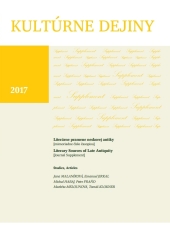Citácie gréckych textov vo Fulgentiovom spise Expositio Virgilianae continentiae secundum philosophos moralis
Quotations from Greek Texts in Fulgentius´s Expositio Virgilianae continentiae secundum philosophos moralis
Author(s): Peter FraňoSubject(s): History
Published by: VERBUM - vydavateľstvo Katolíckej univerzity v Ružomberku
Keywords: Fulgentius;Virgil;Aeneid;allegorization;Late Antiquity
Summary/Abstract: The paper deals with an analysis of eight quotations of ancient Greek texts in Fulgentius’s work entitled The Exposition of the Content of Virgil According to Moral Philosophy. Fabius Planciades Fulgentius was the first Christian writer who decided to allegorize Virgil’s Aeneid. In his sense, the book has a universal meaning: it is a representation of the development of human life from birth to manhood. Fulgentius uses Greek quotations from Homer, Euripides, Carneades and the Corpus Hermeticum collection as arguments from authority. In the prologue, Greek quotations have a deeper philosophical meaning and they illustrate a difference between the philosophical principles substance and accident. In other parts of his work he uses quotations for an etymological interpretation of the names of some persons in Aeneid (Aeolus, Achates, Marica, Turnus, Messapus).It can be said that Greek quotations serve Fulgentius as functional rhetorical means through which he wants to justify and, thanks to ‘referring to authority’ (argumentum ad auctoritate), also support by argument an allegoric interpretation of the text. In the prologue, they have a deeper philosophical meaning as they are to demonstrate a difference between substantial and accidental constituents of reality. In other parts of the text, they are mostly used to justify an etymological interpretation of the names of some of the characters in individual songs of Aeneid.In spite of the apparent fervour and thought originality, however, Fulgentius‘s way of work already considerably devalues the „learned“ form of allegorization, still typical, for instance, for Macrobius (turn of the 4th and 5th centuries AD). “The more diligently Fulgentius uses Greek vocabulary in his Latin text and the more authorities he refers to, the more it is clear how little he is now familiar with the treasury of ancient knowledge and how much he simply makes up the words and names he uses.” Fulgentius‘s work, on the one hand, marks the end of the late ancient literary tradition and, on the other hand, it also opens the door for the newly emerging medieval reception. Since they were written at the “turn of epochs”, the author’s writings constitute a valuable source for studying the contemporary way of allegorization and work with the Greek literary tradition.
Journal: Kultúrne dejiny
- Issue Year: 8/2017
- Issue No: Supplem
- Page Range: 52-62
- Page Count: 11
- Language: Slovak

